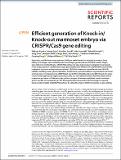Efficient generation of Knock-in/Knock-out marmoset embryo via CRISPR/Cas9 gene editing
Author(s)
Kumita, Wakako; Sato, Kenya; Suzuki, Yasuhiro; Kurotaki, Yoko; Harada, Takeshi; Zhou, Yang; Kishi, Noriyuki; Sato, Kengo; Aiba, Atsu; Sakakibara, Yasubumi; Feng, Guoping; Okano, Hideyuki; Sasaki, Erika; ... Show more Show less
DownloadPublished version (2.514Mb)
Terms of use
Metadata
Show full item recordAbstract
Genetically modified nonhuman primates (NHP) are useful models for biomedical research. Gene editing technologies have enabled production of target-gene knock-out (KO) NHP models. Target-gene-KO/knock-in (KI) efficiency of CRISPR/Cas9 has not been extensively investigated in marmosets. In this study, optimum conditions for target gene modification efficacies of CRISPR/mRNA and CRISPR/nuclease in marmoset embryos were examined. CRISPR/nuclease was more effective than CRISPR/mRNA in avoiding mosaic genetic alteration. Furthermore, optimal conditions to generate KI marmoset embryos were investigated using CRISPR/Cas9 and 2 different lengths (36 nt and 100 nt) each of a sense or anti-sense single-strand oligonucleotide (ssODN). KIs were observed when CRISPR/nuclease and 36 nt sense or anti-sense ssODNs were injected into embryos. All embryos exhibited mosaic mutations with KI and KO, or imprecise KI, of c-kit. Although further improvement of KI strategies is required, these results indicated that CRISPR/Cas9 may be utilized to produce KO/KI marmosets via gene editing.
Date issued
2019-09Department
McGovern Institute for Brain Research at MIT; Massachusetts Institute of Technology. Department of Brain and Cognitive SciencesJournal
Scientific Reports
Publisher
Springer Science and Business Media LLC
Citation
Kumita, Wakako et al. Efficient generation of Knock-in/Knock-out marmoset embryo via CRISPR/Cas9 gene editing. Sci Rep 9, 1 (September 2019): 12719 © 2019 The Author(s)
Version: Final published version
ISSN
2045-2322